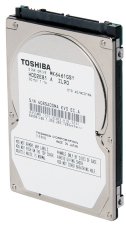
Posted on Tuesday, July 27 2010 @ 22:27 CEST by Thomas De Maesschalck
Toshiba introduced a new line of 7200RPM 2.5" SATA HDDs:
Toshiba Storage Device Division (SDD), the pioneer in small form factor hard disk drives (HDDs), today announced a new family of 7,200 RPM 2.5-inch SATA drives. This represents the industry's first broad line of 7,200 RPM 2.5-inch models optimized for demanding performance, power consumption, and durability requirements across a wide range of high-performance and business-critical applications.
Continuing the Toshiba tradition of leadership and innovation in small form factor storage, this product family offers systems designers a choice of capacities across standard, high-durability, and self-encrypting models. This new HDD family provides extremely quiet operation—the seek acoustics are the same as idle mode. Halogen-free2 and power-efficient, the new models also deliver lowered heat generation and power consumption during operation.
* MKxx61GSY: Available in 160 to 640GB1 capacities, the MKxx61GSY is targeted at high-end notebook PCs, gaming laptops, and mobile workstations as well as all-in-one and slimline desktop PCs. Using Toshiba's extensive experience in the mobile computing market, the MKxx61GSY offers greater power efficiency and durability over 3.5-inch drives.
* High-Durability MKxx61GSYB: Leveraging the MKxx61GSY platform, the MKxx61GSYB series is a high-durability model targeted at demanding 24x7 applications such as network routers, network switches, blade servers, and point-of-sale terminals in a full range of capacities from 80 to 500GB. The MKxx61GSYB offers nearline storage levels of reliability and performance in a small form factor design.
* Self-Encrypting Drive (SED): The third member of the family, designed to the TCG Opal Specification, provides industry-standard, government-grade security features for organizations wanting to secure data at rest for compliance with data privacy policies. The SED drives will be available after launch of the GSY and GSYB series models.
Additionally, an optional free-fall sensor in the MKxx61GSY responds to drop events to securely lock the heads in place off the media before system impact. This is an added benefit for mobile applications and gives an extra level of ruggedness and durability to the Toshiba solution.
"With this family, Toshiba is addressing the high-performance 2.5-inch market and enabling system differentiation in the fiercely competitive notebook PC market. The MKxx61GSY is designed for speed, with a balanced approach to storage capacity, durability, power consumption, and acoustics, compared to 5,400 RPM mobile and 3.5-inch desktop drives," said Maciek Brzeski, vice president of marketing at Toshiba Storage Device Division. "We have been able to transfer our extensive experience to the enterprise market so that the MKxx61GSYB meets demanding applications that require greater durability, availability, and performance."
"Extracting additional value from HDDs with performance, security, and other features is challenging, requiring market savvy in addition to technological prowess from the HDD supplier," says John Rydning, research director at IDC. "Executing on this strategy, Toshiba is addressing the market's needs with a differentiated product line-up based on one family which helps customers get to market efficiently with key product differentiation."
Toshiba has started shipping the MKxx61GSY, with volume production scheduled in the third quarter of 2010. The MKxx61GSYB will be available in the fourth quarter of 2010 and availability of the SED models will be announced at a later date.
